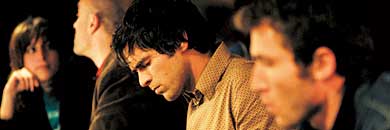The Beat that My Heart Skipped (15)
Hitting the right note

Tom is a lowlife, but he's not without a soul: his late mother was a concert pianist, and it seems that she bequeathed some of her talent to him; though he has neglected the piano for years, he still feels magic in his hands.
Audiard and his co-writer Tonino Benacquista have adapted from James Toback's 1978 movie Fingers, in which Harvey Keitel played a Mafia enforcer with a passion for classical piano. If nothing else, they are inverting a notable (and much abused) tradition - the traffic in remakes usually flows from France to the US. This is a leaner, more realistic film than Toback's, and its protagonist is a more conflicted figure than Keitel. On the surface Tom seems a regular urban desperado, greedily inhaling his smokes like Belmondo in A Bout de Souffle and drumming his hands on bar-tops and car dashboards in time to the electro soundtrack on his headphones. A snort of coke here, a ruck in a bar there: you wouldn't pick this guy for a fan of Bach's toccatas.
Then Tom runs into his mother's old concert-promoter, who remembers him as a promising young pianist and offers him an audition. Some instinct for self-improvement is reawakened, and he launches into a frenzy of rehearsing, coached by the diffident Chinese pianist Miao Lin (Linh Dan Pham), who has recently arrived in Paris with little money and less French. But the underworld continues to exert its gravitational pull on Tom. "Audition - you?" asks his father (Niels Arestrup), a louche operator who knows how to get what he wants out of him. His scumbag associates are even less inclined to tolerate his rediscovered forte: "Shit, I'll take up the banjo," jeers one of them.
It isn't just the pressure of maintaining this double life that prompts our concern; hunched in concentration over the keyboard, Tom radiates an intensity so combustible one fears he might burst into flames at any moment. He needs this music more than he would dare admit. When he can't get it right he roars in frustration, as if the piano keys are playing him false.
The film handles the relationship between teacher and pupil quite beautifully. Separated by language, Tom and Miao Lin can only communicate through gesture and music, and, as we watch, their awkwardness quietly blooms into affection. It's not unlike the reticence that unites the near-deaf secretary and the ex-con in Read My Lips; somehow the pauses and silences that gather, rather than driving them apart, initiate a kind of intimacy. There's no corniness here about "the shared gift of music", because there's something irresistibly comic about Tom's struggle with himself, with his playing, and with the delicacy he vaguely realises is expected of him. After one successful lesson he triumphantly sparks up a cigarette, oblivious to his (anti-smoking) tutor's moue.
It would take a good actor to inhabit this high-low role, and in Romain Duris the film has an electrifying one. Twitchily alert, he has a ferrety handsomeness and a slow smile that grows on you; he plays Tom's moods as skilfully as those toccatas, and when that sullen brow lifts we see just how charming he can be. He uses his hands expressively, fluttering them over an imaginary keyboard or anxiously staring at a wound on his palm - the result of a frying-pan he has recently used to ding the head of one of his father's disobliging tenants. The film's costume designer, Virginie Montel, has been shrewd in outfitting him: we hardly ever see him without a shirt and tie, the signifiers of respectability, yet Tom slightly spoils the effect by teaming them with a yobbish leather blouson. He can't decide which look he ought to be going for.
That's why The Beat That My Heart Skipped is so engrossing: Tom's dilemma splits between different but precarious futures. Either he risks humiliation as a would-be pianist, or he risks his soul as a career criminal. The film doesn't exactly glamorise the latter option, but it intimates how it might be attractive to a pistol such as Tom: the freedoms, the easy money, the camaraderie - even if it is with bullies and villains. Yet it also suggests how this uncertain venture back into music may have civilised Tom, particularly in the way he treats women. In an early scene with his father's new girlfriend (Emmanuelle Devos, who starred in Read My Lips) he practically accuses her of being a whore; by the end he has proved himself almost a gallant.
Audiard invests a fair deal of suspense in this rake's progress, and he has the nerve to serve up the dramatic crux, the moment when Tom's two worlds finally collide, in a way we could hardly have anticipated. (I had envisaged something along the lines of Paul Newman's punishment in The Hustler). What sounds schematic on the page - a conflict between parental influences, art and crime, violence and redemption - is played out with a thrilling, headlong momentum under Audiard's direction.
If you didn't already know it from his earlier A Self-Made Hero and Read My Lips, this should clinch Audiard's reputation as one of the most exciting film-makers around.
Join our commenting forum
Join thought-provoking conversations, follow other Independent readers and see their replies
Comments
Bookmark popover
Removed from bookmarks